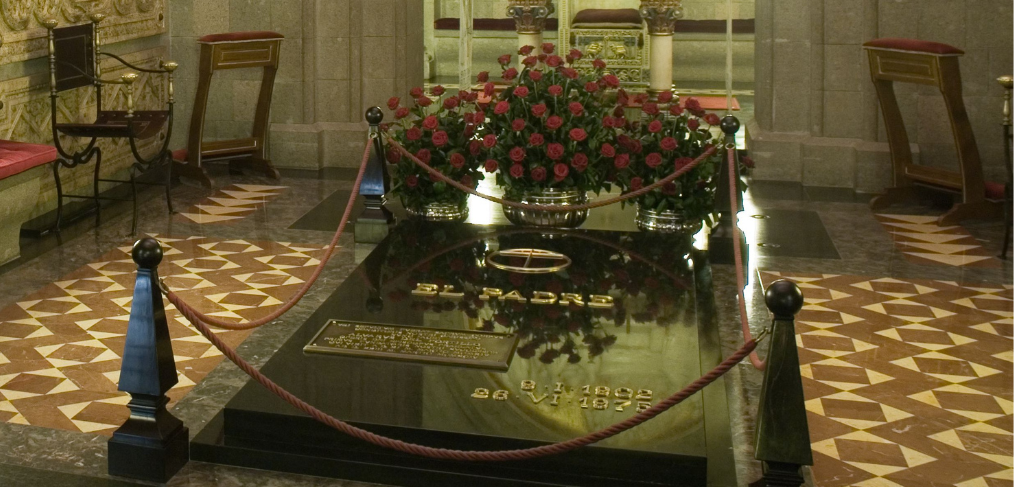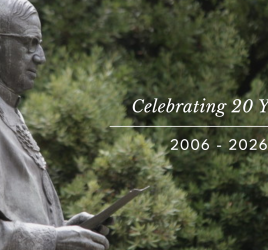
Simply the Father
On the occasion of Saint Josemaria’s feast day on June 26, Fr. Andrea Mardegan offers a reflection on the spiritual fatherhood of the Founder of Opus Dei, and the meaning of the phrase “every soul has his or her own path.”
Recently I was able to celebrate Mass in the crypt of the Church of Our Lady of Peace in Rome, where Saint Josemaria and some of his spiritual sons and daughters are buried. Visitors there find it easy to reflect upon the peace of Heaven, and to pray for the faithful departed.
What will Heaven be like? Jesus said little specifically about Heaven, but He did make it clear that good and faithful servants will be quite busy there: “Well done, good and faithful servant; you have been faithful over a little, I will set you over much; enter into the joy of your master” (Mt 25:21-23).
Saint Josemaria intuited this when he said that he would be able to help his children even more after he died. Shortly after his death, Blessed Alvaro told us that Saint Josemaria had suggested writing on his tomb, below his name, the word “PECCATOR”: “SINNER.” He said they could also add “genuit filios et filias” — “He begot sons and daughters” — if they wanted. This phrase is used in Genesis to describe the Patriarchs. A sinner who begot spiritual sons and daughters. A very meaningful way to describe oneself, and for us to understand what a saint is, bringing him closer to us.
To Blessed Alvaro, it seemed only right, out of filial affection, not to honor this desire of the Founder. He put there neither “sinner” nor the phrase from Genesis, but simply “The Father.” Saint Josemaria also liked to describe himself as “a sinner who loved Jesus Christ.” This definition helps us to overcome an ever-lurking perfectionism, and to understand holiness as God’s saving action in us.
Blessed Guadalupe, who wrote to Saint Josemaria saying she found it hard to be orderly, and that she couldn’t manage to fulfill everything in her plan for her spiritual life, is now blessed with eternal life in God. And with her, there are so many others: anonymous, hidden saints in Heaven, contemplating God face to face. I can imagine Guadalupe thanking the Father, Saint Josemaría, for helping her to see her vocation to Opus Dei. It will remind him of his first dialogue with her, when she was a young chemistry professor. “That meeting was decisive for my life, in that house at Jorge Manrique Street, number 19, in the outskirts of Madrid. In a living room with antique pink wallpaper, the figure of the Father appeared. We sat down and he asked me, ‘What do you want from me?’ I answered, without knowing why, ‘I think I have a vocation.’ The Father looked at me. ‘I can’t tell you that,’ he said. ‘But if you want I can be your spiritual director, confessor, and get to know you…’ It was exactly what I was looking for. I had the clear feeling that God spoke to me through that priest, not only with his words, but with his prayer for me.”
Saint Josemaría sometimes imagined that Heaven for him would mean putting himself in a corner and contemplating his spiritual sons and daughters above him, much holier than he, filled with God’s love. I can imagine his joy now at seeing his children in Heaven, close to Christ. He will rejoice in a special way seeing that they are all different, as he always wanted. “You must be as different from one another as the saints in Heaven, each of whom has their own personal and very special characteristics,” (The Way, no. 947).
Saint Josemaría was a strong advocate for a diversity of holiness: men and women from every corner of the world, each with his or her own personality and spiritual path. “My experience as a priest tells me that every soul has its own path.” Each has his or her personal life and relationship with God. At the same time, the saints in Heaven are similar to each other because they have all been shaped by the Holy Spirit in Christ’s image. But no one is a copy of the other. They are not classifiable. Each has their own personality, like the Persons of the Blessed Trinity. And so Heaven is the fullness of variety, working full-time for the good of the earth: the saints assisting God to make all things new.
On this June 26, let us go to this saint who called himself a sinner and who begot spiritual sons and daughters, including Guadalupe, this saint with a big smile on his face, asking him to beseech the heart of Jesus, close to Holy Mary and Saint Joseph, for a new Pentecost on earth.
We pray that we may help make these words of Pope Francis about Guadalupe a reality: “Holiness means opening one’s heart to God and allowing Him to transform us with His love; it also means going out of ourselves so as to meet others where Jesus awaits us, to bring them a word of encouragement, a helping hand, a look of tenderness and consolation. With the joy that came from knowing she was a daughter of God, as she had learned from Saint Josemaría himself, Guadalupe Ortiz placed her many human and spiritual qualities at the service of others, helping in a particular way other women and families in need of education and development. She did all this not with a proselytizing attitude but simply through her prayer and witness. I encourage all the faithful of the Prelature, and all who take part in their apostolates, always to aspire to this holiness of ‘normality,’ which burns within our hearts with the fire of Christ’s love, and which the world and the Church are so in need of today.”
Fr. Andrea Mardegan was born in Milan in 1955. He obtained a degree in modern literature at Catholic University in Milan and a Ph.D. in biblical theology at University of Navarre, Spain. In 1984, he was ordained a priest by Pope John Paul II and worked to foster many youth activities in Verona, Italy. At present, he is the spiritual director of Opus Dei in Italy and chaplain of Torriana University College in Milan. He is also involved in programs for the formation of priests. He is the author of I Took You in My Arms: Reflections on Divine Filiation by St. Josemaría Escrivá published by Midwest Theological Forum.
This article is originally published on the Opus Dei website and shared here with permission.




